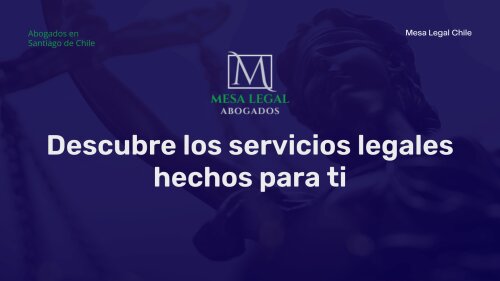Best Child Custody Lawyers in Santiago
Share your needs with us, get contacted by law firms.
Free. Takes 2 min.
Free Guide to Hiring a Family Lawyer
List of the best lawyers in Santiago, Chile
About Child Custody Law in Santiago, Chile
Child custody, known locally as "tuición" or "cuidado personal," refers to the legal rights and responsibilities regarding the care and upbringing of children after parents separate or divorce. In Santiago, Chile, as in the rest of the country, child custody is focused on protecting the best interests of the child. The law aims to ensure children have continuous contact with both parents whenever possible and that their physical, emotional, and social needs are met.
Why You May Need a Lawyer
Child custody matters can be complex and emotionally charged. People often seek legal help in Santiago for a variety of reasons, such as:
- Disagreements over who should have primary custody of the children
- Issues related to visitation schedules and enforcement
- Requests to modify existing custody arrangements due to changes in circumstances
- Concerns about child safety or a parent’s ability to provide adequate care
- Disputes involving relocation of a child out of Santiago or Chile
- Facing accusations of neglect or abuse
- Establishing legal paternity to assert custody rights
- International custody disputes, including parental abduction cases
An experienced lawyer can provide guidance, negotiate agreements, represent clients in court, and help ensure that the child's best interests are prioritized.
Local Laws Overview
Child custody law in Chile is primarily governed by the Civil Code and related family law statutes. Here are some key aspects specific to Santiago, Chile:
- Both mothers and fathers have equal rights to custody under Chilean law. There is no automatic preference granted to either parent based on gender.
- If parents cannot reach an agreement regarding custody ("acuerdo de cuidado personal"), a Family Court ("Tribunal de Familia") in Santiago will decide based on the child's best interests.
- The court will consider factors such as the child's age, emotional bonds, parental abilities, existing living arrangements, and the child's preferences if they are old enough to express them.
- Shared custody arrangements are possible and encouraged if both parents are suitable and able to cooperate.
- Decisions about child support payments are made separately but often in parallel with custody matters.
- If circumstances change, either parent can request modifications to custody or visitation agreements through the court.
- Removal of a child from the country usually requires consent from both parents or court authorization.
Frequently Asked Questions
What types of custody exist in Santiago, Chile?
There are two main types: sole custody (“cuidado personal exclusivo”) granted to one parent, and shared custody (“cuidado personal compartido”) where both parents actively participate in raising the child.
How is custody decided if parents are not married?
Unmarried parents have the same rights as married ones. If there is a dispute, either parent can file for custody in Family Court, where decisions are based on the child's best interests.
Can children choose which parent they live with?
The court may consider the child’s opinion if they are mature enough, typically over the age of 12, but the final decision rests with the judge.
Do grandparents have rights to custody or visitation?
Grandparents can apply for visitation rights if it serves the child’s welfare. In exceptional cases, they may also seek custody.
What if a parent needs to relocate with the child?
Relocation that affects the other parent’s access to the child generally requires consent from both parents or a court order.
Is mediation required before going to court?
Family Courts often encourage or require mediation before a dispute proceeds to a hearing. Mediation can help parties reach agreements amicably.
How long does the custody process take in Santiago?
The time frame varies depending on the complexity of the case and whether it can be resolved through agreement or requires a full court hearing. Simple cases may take a few months, while complex ones can last longer.
Can custody be changed after an agreement is in place?
Yes, if circumstances change significantly, a parent can petition the Family Court to modify custody or visitation agreements.
What are the main considerations for the court in deciding custody?
The primary consideration is the child’s best interests. The court looks at emotional bonds, the ability of each parent to provide care, the child's living environment, and, in some cases, the child's preferences.
What can I do if the other parent is not complying with the custody order?
You can file a complaint with the Family Court, which has the authority to enforce custody and visitation orders and sanction non-compliance.
Additional Resources
If you need further guidance or support, you can consult the following resources in Santiago, Chile:
- Family Courts (Tribunales de Familia): Handle all matters related to custody, visitation, and child support.
- Corporación de Asistencia Judicial: Provides free or low-cost legal assistance for those who qualify.
- SERNAMEG (Servicio Nacional de la Mujer y la Equidad de Género): Offers advice and support in family law matters, especially for women and children.
- Chile’s Child Protection Agency (SENAME): Involved in cases where the welfare of a child is at risk.
- Certified Family Law Lawyers: Consider consulting a local attorney with experience in child custody cases.
Next Steps
If you are facing a child custody issue in Santiago, Chile, consider taking these steps:
- Gather all relevant documents, such as birth certificates, existing agreements, and evidence of parental involvement.
- If possible, try to reach an amicable agreement with the other parent. Consider attending a mediation session.
- If an agreement is not possible or if the situation involves complex issues, seek legal advice from a qualified family law attorney.
- Contact your local Family Court to understand the process and requirements for filing a custody petition.
- If you have safety concerns about your child, contact relevant authorities immediately.
- Take advantage of free or subsidized legal resources if cost is a concern.
Prompt and informed action can help protect your rights and, most importantly, the welfare of your child. Legal professionals in Santiago are equipped to guide you throughout the process and help achieve the best outcome for your family.
Lawzana helps you find the best lawyers and law firms in Santiago through a curated and pre-screened list of qualified legal professionals. Our platform offers rankings and detailed profiles of attorneys and law firms, allowing you to compare based on practice areas, including Child Custody, experience, and client feedback.
Each profile includes a description of the firm's areas of practice, client reviews, team members and partners, year of establishment, spoken languages, office locations, contact information, social media presence, and any published articles or resources. Most firms on our platform speak English and are experienced in both local and international legal matters.
Get a quote from top-rated law firms in Santiago, Chile — quickly, securely, and without unnecessary hassle.
Disclaimer:
The information provided on this page is for general informational purposes only and does not constitute legal advice. While we strive to ensure the accuracy and relevance of the content, legal information may change over time, and interpretations of the law can vary. You should always consult with a qualified legal professional for advice specific to your situation.
We disclaim all liability for actions taken or not taken based on the content of this page. If you believe any information is incorrect or outdated, please contact us, and we will review and update it where appropriate.













